Dawn trade at Billingsgate fish market
- Published
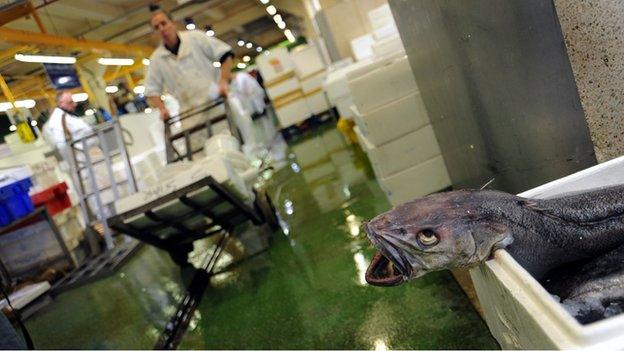
Billingsgate Market is the largest inland fish market in the UK. The original market traded in Lower Thames Street for 900 years, before moving to east London in 1982.
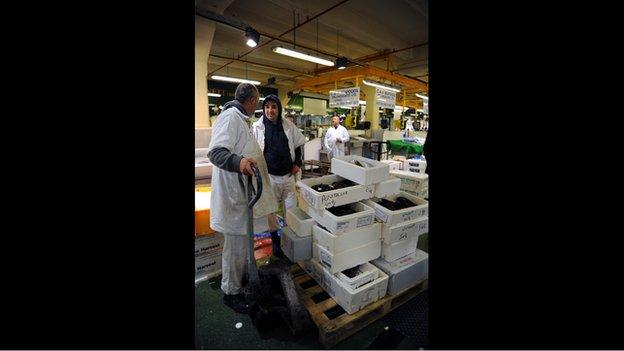
The market is run by the City of London Corporation. Fifty-four licensed fish merchants trade 25,000 tonnes of fish each year, 40% of which is imported, and its annual turnover is currently estimated to be £200m.
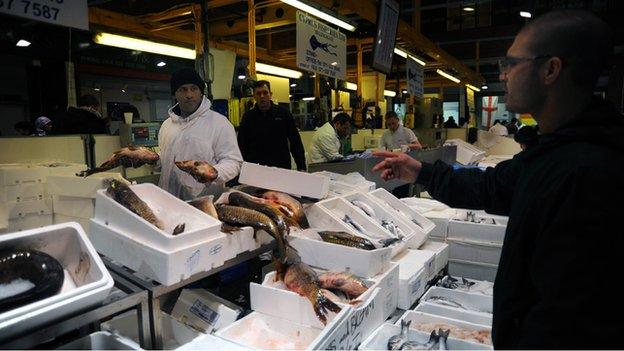
Cod, haddock, plaice, sole and salmon (filleted and ready for sale), as well as shellfish, arrive overnight on lorries from as far afield as Scotland and Cornwall.
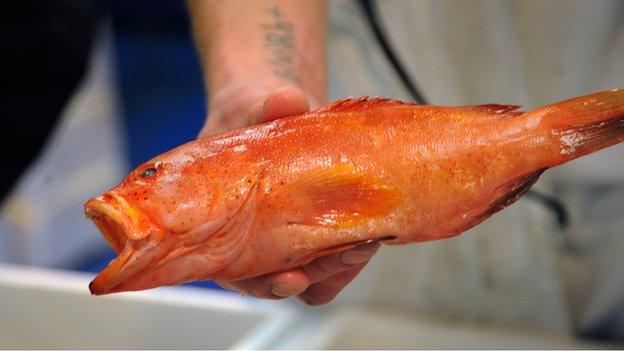
Exotic warm water fish such as parrot fish, tilapia and grouper also arrive from more distant waters, having been caught, chilled, packed and flown directly to London's Heathrow Airport.
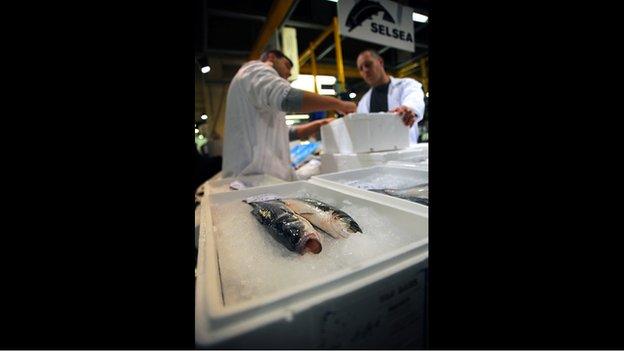
It is still dark when, at 0500, a bell chimes to mark the official opening of the market and trading can commence.
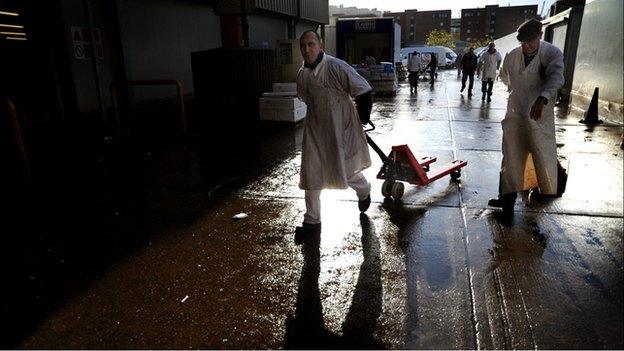
Up until the end of April 2012, the only people permitted to move fish were traditional fish porters, a strongly unionised workforce who were employed by the merchants under by-laws dating from 1876.
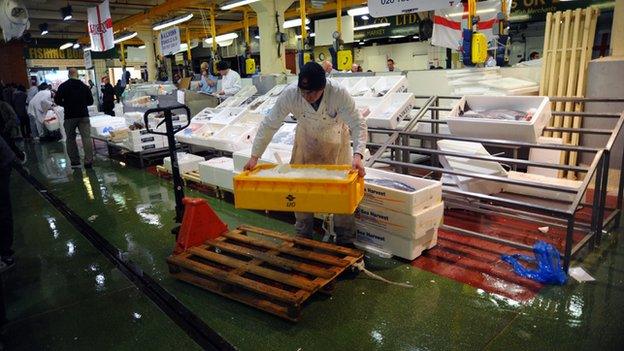
But the City of London Corporation repealed the by-laws this year, saying they were "obsolete, out-of-date, and irrelevant in modern times". The 93 fish porters were made redundant, although some were rehired on less generous terms.
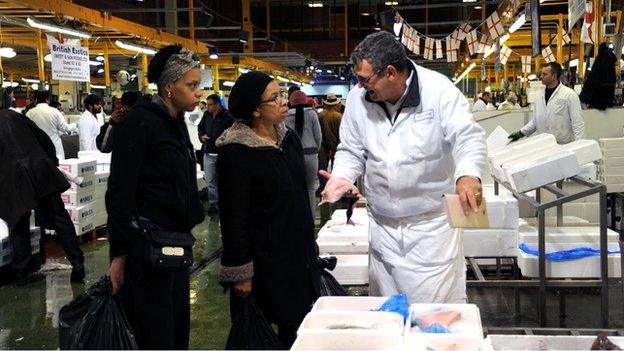
The buyers are mainly fishmongers, hoteliers and restaurateurs - but a healthy percentage are private individuals buying for their families.
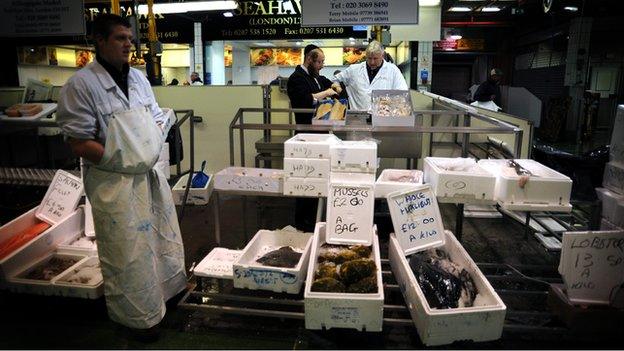
Most of the fish is chilled, rather than frozen. Few fish-and-chip shops buy from Billingsgate as most of them buy wild-caught, frozen-at-sea fish from suppliers in Iceland and Norway.
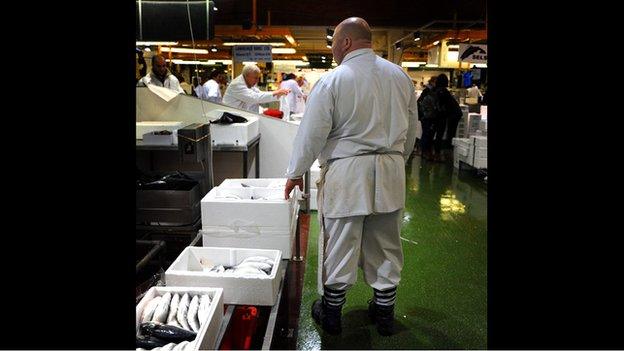
The emphasis is on freshness but some species can be "too fresh". Turbot and Dover sole suffer from a form of rigor mortis and need to "settle down" before they are ready to eat.
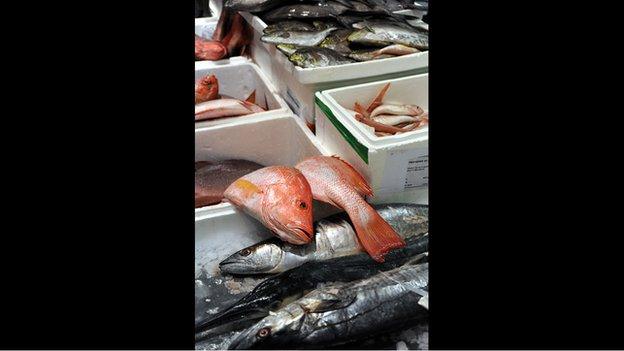
Fish merchant Alan Cook says: "A lot of people don't realise that the fishing depends on weather and tides. We are not looking in a field for it. It's trial and error."
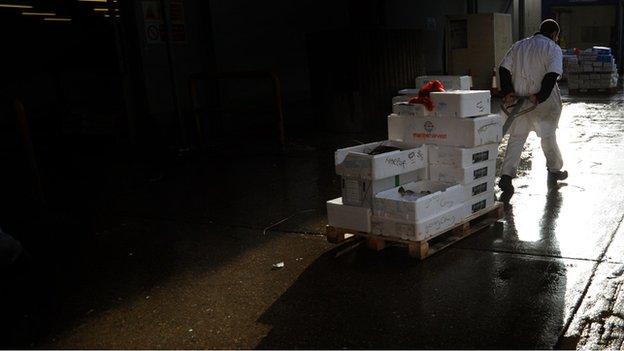
By 0730, most of the fish has already been sold and many of the buyers have left.
<bold>Key talks are under way about EU fishing quotas, but what is life like at one of Britain's biggest fish markets, Billingsgate in London? </bold>
Every morning up to 150 species of fish and shellfish from all over the world arrive at London's Billingsgate market.
Fish from Cornwall, Scotland and all over the UK are brought by lorry overnight, while more exotic species arrive by air and are transported from Heathrow Airport.
The market has been on its current site in east London since 1982 and is now in the shadow of the Canary Wharf business district.
Every morning, from the traditional bell for the start of trading, the merchants sell to fishmongers, restaurateurs and ordinary members of the public.
Fishmonger Rex Goldsmith - who runs shops in Guildford, Surrey and Chelsea, west London for a wealthy and discerning clientele - turns up at 0500 every day to buy fresh produce.
"Many of my customers are French or Italian. They are very savvy shoppers who don't have a pre-conceived idea. They see what's available and then they will cook something using that," he told the BBC.
Among the more obscure produce he buys at Billingsgate are gull's eggs from Hampshire, which he sells for £4 each.
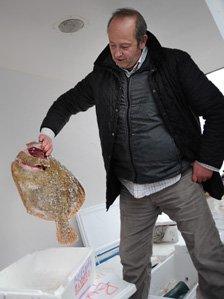
Fishmonger Rex Goldsmith likes to come to the market to check the fish he is buying
Many of Billingsgate's customers are families from ethnic minorities.
Chinese and Thai people rub shoulders with Sri Lankans and people from the African and Afro-Caribbean community.
Horace Francis, who is of Jamaican origin, says: "I come down once or twice a month to buy stuff for the family. The kids like fish. It's mainly snapper and bream.
"If we're cooking snapper it will be steamed or in a brown stew with vegetables, lots of fish seasoning, Caribbean-style, with a kick to it."
Most of the fish is chilled, rather than frozen. Although the emphasis is on freshness, some species can be "too fresh".
All fish suffers from rigor mortis but turbot and dover sole in particular need to "settle down" or "relax" before it is ready to eat.
Fish merchant Bob Bush says: "People between the ages of 25 and 50 are more conscious of what they are eating nowadays and want to know where it's come from. At supermarkets they don't have that sort of expertise."
Another merchant, Alan Cook, says: "A lot of people don't realise that the fishing depends on weather and tides. We are not looking in a field for it.
"It's trial and error. If the tides are high they can't get their crab and lobster pots and if the weather kicks in, it's very bad for fishing. The weather in Scotland has been very poor and there are few live crabs."
By 07:30, with the sun having risen over Canary Wharf, most of the customers have gone and the merchants and their porters - some of whom started work at midnight - are clearing up and fighting off the hovering seagulls.
Up until the end of April 2012 the only people permitted to move fish were traditional fish porters, a strongly unionised workforce who were employed by the merchants under by-laws dating from 1876.
But the City of London Corporation recently repealed the by-laws, and as a result the 93 fish porters were made redundant, although more than 30 were later rehired on less generous terms.
Malcolm Macleod, the market's superintendent, said they had to "modernise" Billingsgate to compete with other markets and with traders who sold online.
Since the beginning of May the market has been open an hour earlier, from 0400, and there are rumours it might soon open on Mondays, a day the market has traditionally remained closed.
Colin Drake, 65, from Canvey Island, Essex, counts himself as one of the lucky porters as he can retire with a lump sum.
"But a lot of the lads have back trouble or bad knees from years of working here. There are a lot of divorces. A lot of the porters were taxi drivers as well so they rarely got home," he said, his eyes watering as he took one last look around the market where he worked for 25 years.
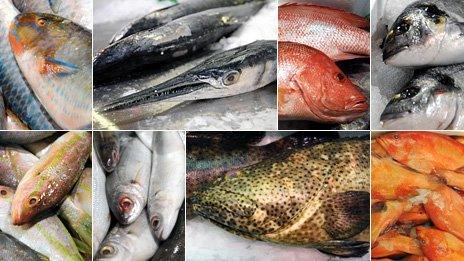
A vast array of varieties of fish is sold at Billingsgate Market